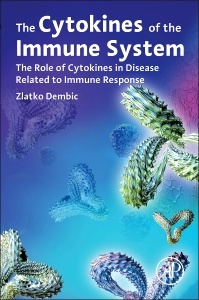Description
The Cytokines of the Immune System
The Role of Cytokines in Disease Related to Immune Response
Author: Dembic Zlatko
Language: English
Subject for The Cytokines of the Immune System:
Keywords
γδT lymphocytes; activation; adaptive; anti-inflammatory; antigens; B-cell development; CCLs; CCRs; CIS; CNTF; complement; coreceptors (CD4 and CD8); CSF; CX3CLs; CX3CRs; CXCLs; CXCRs; cytokines; danger; development; diapedesis; effector cells; function; GM-CSF; growth; HLA; hormones; immune response; immunoglobulins; innate; integrity; interferon-γ (IFN-γ); interferon-λs (IL-28; -29); interferons-a/ß; LIF; M-CSF; master regulators of differentiation; memory cells; MHC associations with diseases; migration; network; organ transplantation; OSM; pattern recognition; proinflammatory; receptors; regulation; regulatory; repertoire; self-nonself discrimination; signal transduction; SOCS; specific recognition; specificities; structure; T-cell development; TGF-ß; Th1; Th17; Th2; Th22; Th3; Th9; tissue typing; TNF-a/ß; tolerance; Tr1; Tregs; TSLP; XCL; XCR
320 p. · 15x22.8 cm · Paperback
Description
/li>Contents
/li>Readership
/li>Biography
/li>Comment
/li>
The Cytokines of the Immune System catalogs cytokines and links them to physiology and pathology, providing a welcome and hugely timely tool for scientists in all related fields. In cataloguing cytokines, it lists their potential for therapeutic use, links them to disease treatments needing further research and development, and shows their utility for learning about the immune system. This book offers a new approach in the study of cytokines by combining detailed guidebook-style cytokine description, disease linking, and presentation of immunologic roles.
graduate students to scientists, researchers, teachers in microbiology, immunology, biochemistry, cell biology, medicine, cytokine biology, odontology and clinicians in all specialties of medicine and surgery, drug pharmaceutical companies, R&D divisions.
As a scientist and a medical doctor, Dr. Dembic’s research interests are at the crossroads of medicine and biology, related to molecular and cellular immunology. During the last twenty years of the past century he’s worked on important issues in immunology at the Max-Planck-Institute for Biology (Tubingen, Germany), the Basel Institute for Immunology (Switzerland; CH) and the Hoffman-La Roche AG (Basel, CH). His team was the first to report the identification of genes underlying T-cell specificity and recognition (mouse T-cell receptor, in '86, Nature). Likewise, his team led the research on molecular cloning of human cytokine receptors important for the effector phase of immunity such as the interferon-gamma receptor (IFNGR1; in '88, Cell) and the tumor necrosis factor receptor-2 (TNFR2; in '90, Cytokine).
In 1995, Dr. Dembic moved to the Institute of Immunology at the University of Oslo, Norway. Since then he broadened the scope of his research by working on T-cell development, cancer immunobiology, immunogenetics and susceptibility to cancer and infectious diseases. All of this would not have been possible without a substantial contribution from his academic collaborators and colleagues internationally, and especially in Norway and Croatia. Some of these studies led him to propose a model about the workings of the immune system called the "integrity" model in the mid-nineties. It stresses that immunity is not only a defense system, but also a selector of potential symbionts and commensals. The use of soluble mediators (cytokines) in communication between immune cells is perhaps only in part similar to neural networks, as interacting cells constitute mobile units within the body.
Dr. Dembic’s publication list has over 80 scientific contributions. Ten percent were published in high impact factor scientific journals (Nature, Cell etc) with himself as a prominent author (in half of them). Perhaps, they stand as a witness of delight that he had by doin
- Supplies new ideas for basic and clinical research
- Provides cytokine descriptions in a guidebook-style, cataloging the origins, structures, functions, receptors, disease-linkage, and therapeutic potentials
- Offers a textbook-style view on the immune system with the immunologic role of each cytokine
These books may interest you

Cytokines and the CNS 74.82 €



